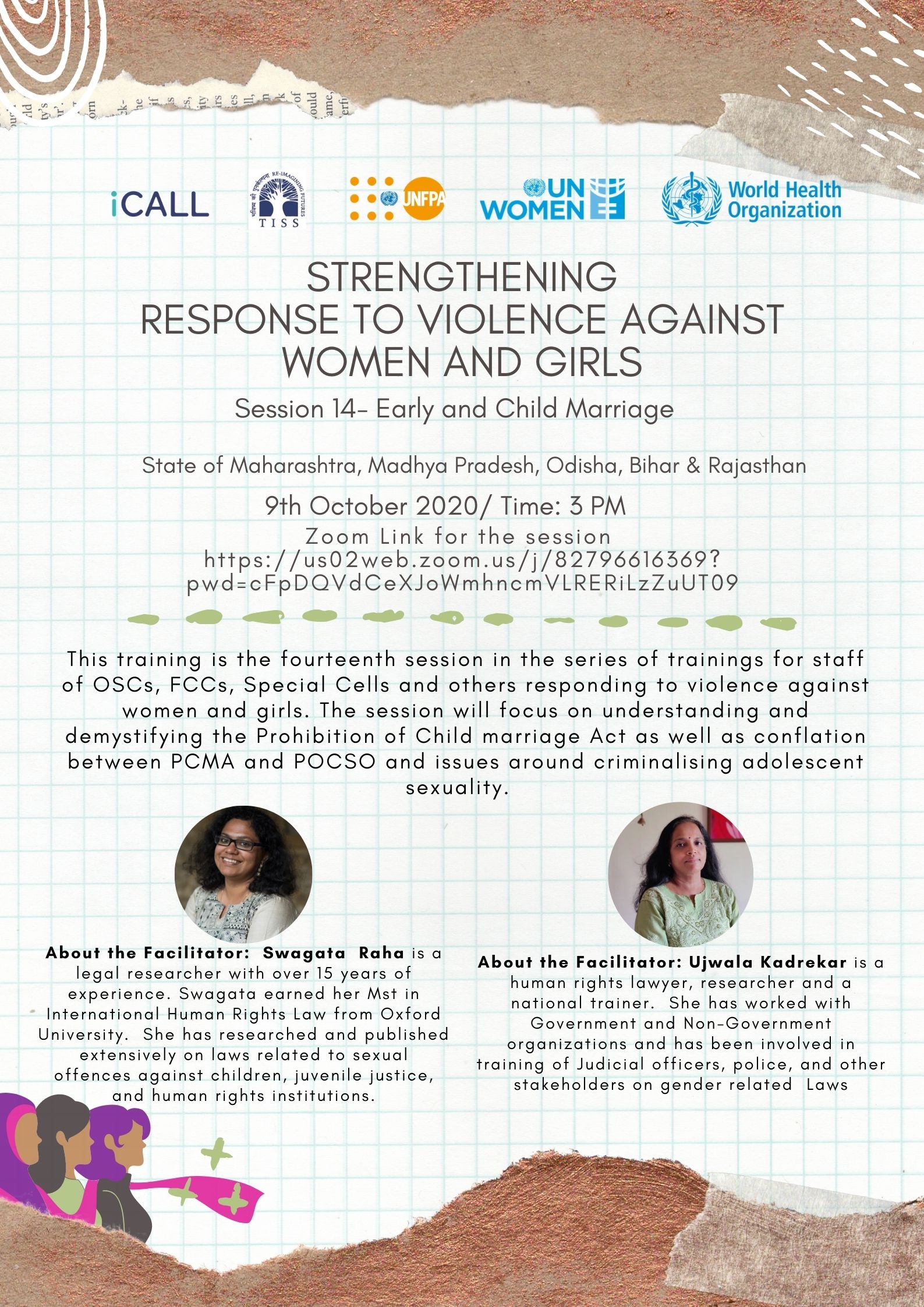‘Violence Against Women During COVID-19: Holistic Assessment & Counselling Skills’ organised on 28 April 2020
Facilitated by Dr. Aparna Joshi, Project Director, iCALL and Ms. Tanuja Babre, Programme Coordinator, iCALL
Summary of the session:
The session was conducted on 28 April 2020, by Dr Aparna Joshi and Tanuja Babre from iCALL, in collaboration with Anuja Gulati of the UNFPA. The objective of the session was to introduce and address the new dimensions of violence against women that have emerged in the context of COVID-19. It provided a brief overview of the primary, and most urgent goals of counselling in emergencies, and how interventions such as risk assessment and safety planning must be prioritised and undertaken. It also addressed certain pandemic specific needs such as the necessity of the counselor to be familiar with the workings of the disease, referral linkages including welfare schemes relating to the pandemic , and the ability to use technology effectively as a counselling platform as a substitute for in-person sessions. Finally, it highlighted the need for counsellors to emphasise self care. Each area will be explored in greater detail in subsequent sessions.
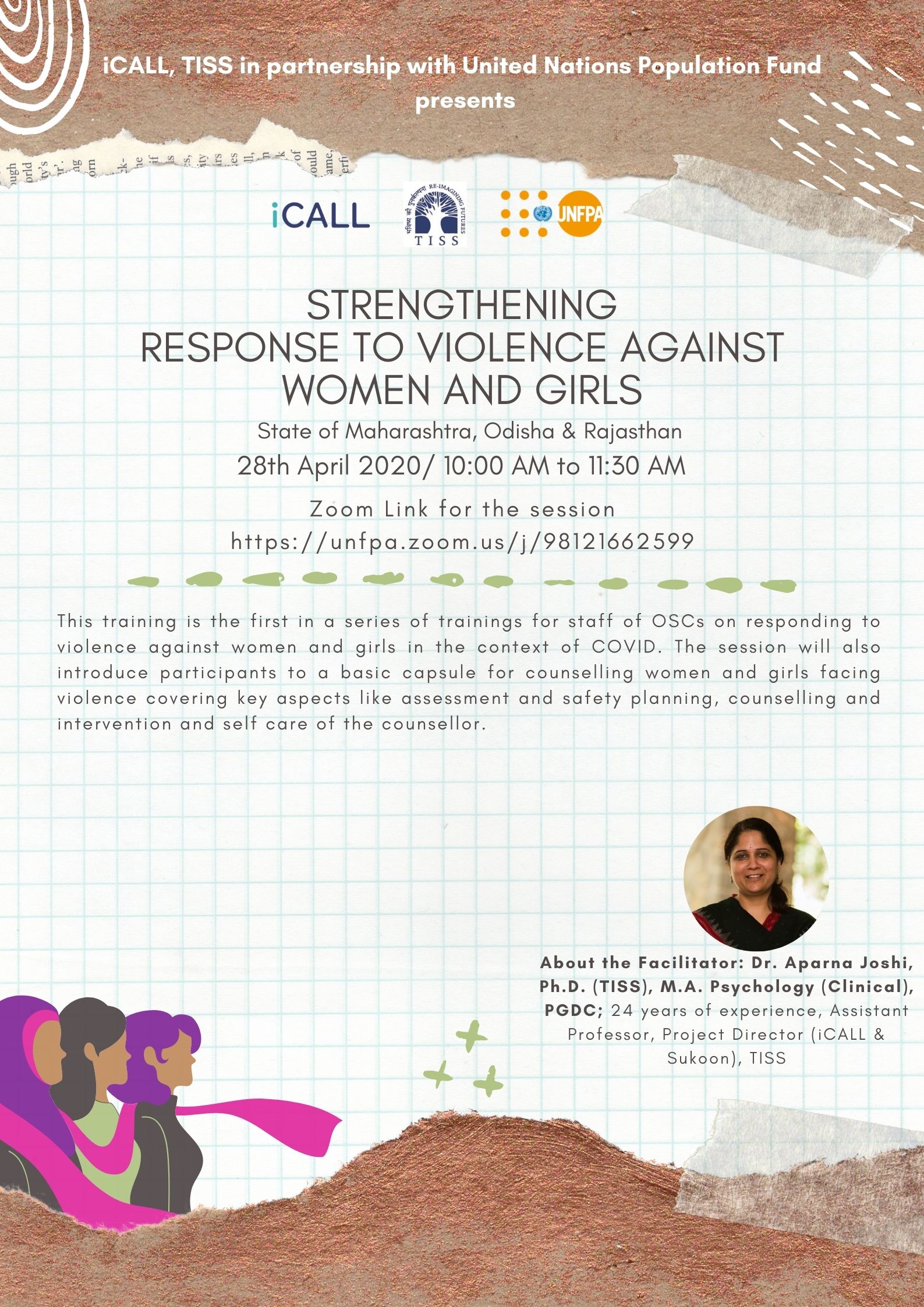

‘Understanding the Protection of Women from Domestic Violence Act’ organised on 11th of May 2020
Facilitated by Advocate, human rights lawyer, researcher and a national trainer Ms. Ujwala Kadrekar
Summary of the session:
The training titled ‘Understanding the Protection of Women from Domestic Violence Act’ was facilitated by Advocate Ujwala Kadrekar. Ms Kadrekar is a human rights lawyer, researcher, and a national trainer. She has played an imperative role in the drafting of the Protection of Women from Domestic Violence Act 2005. In the session, Ms. Kadrekar, explained the nuances of the Act along with its key features, major components, related rights and remedies, and how the Act would play out in the context of the COVID pandemic.
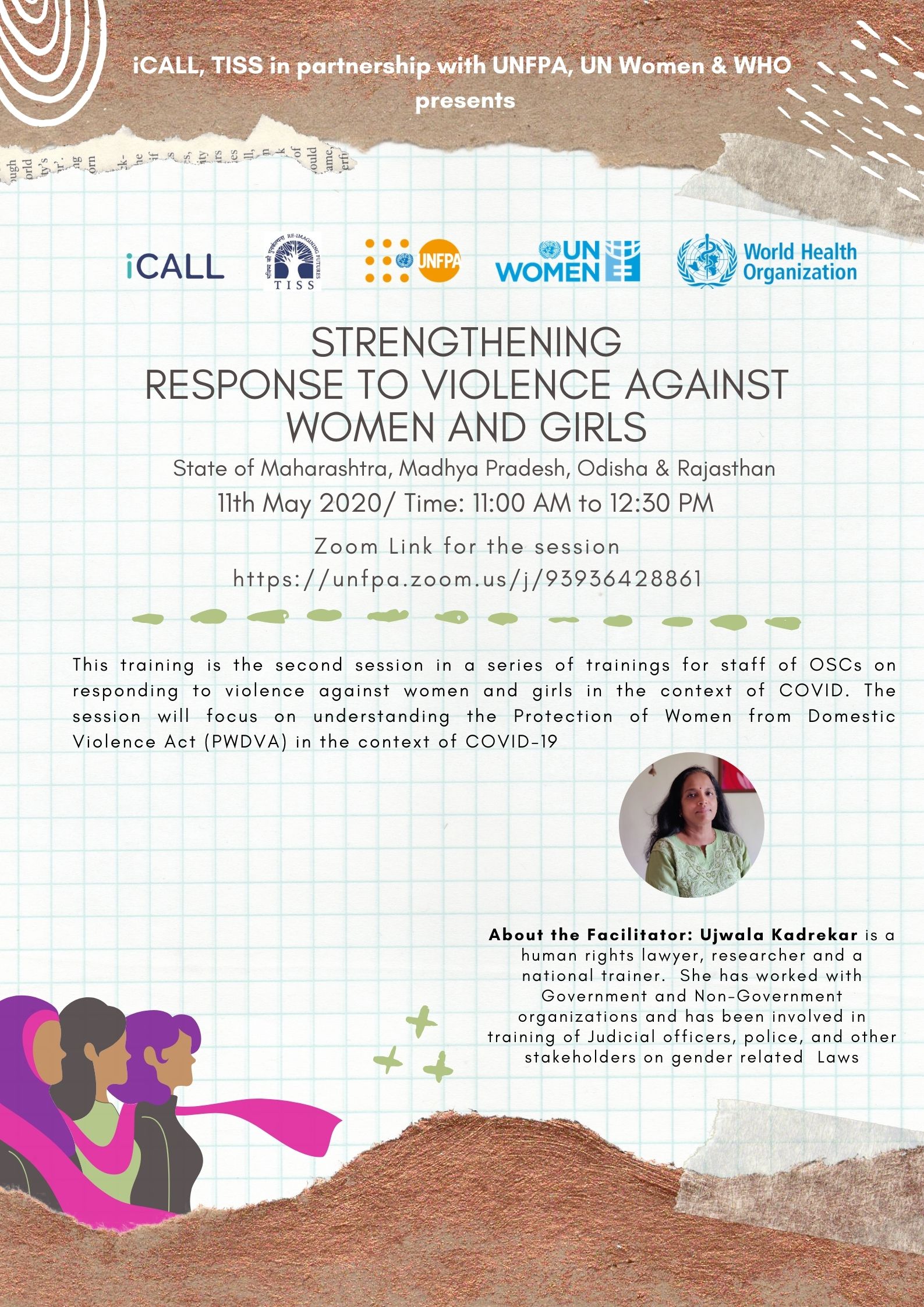

‘Forming a Legal Response’ organised on May 19, 2020
Facilitated by Advocate, human rights lawyer, researcher and a national trainer Ms. Ujwala Kadrekar
Summary of the session:
The third session in the series was an extension of the session on PWDVA by Ujwala Kadrekar and was conducted on the 19th May, 2020. It sought to elucidate the role of the Protection Officer as a crucial bridge between the woman in need of relief/s and agencies providing such relief/s. Ms. Kadrekar explained the steps of recording a Domestic Incident Report (DIR) and other relevant forms that are to be filled when an aggrieved woman approaches a PO. Along with the technicalities, the trainer also established the importance of crucial details, informed consent as well as a supportive, patient and empowering communication mechanisms.
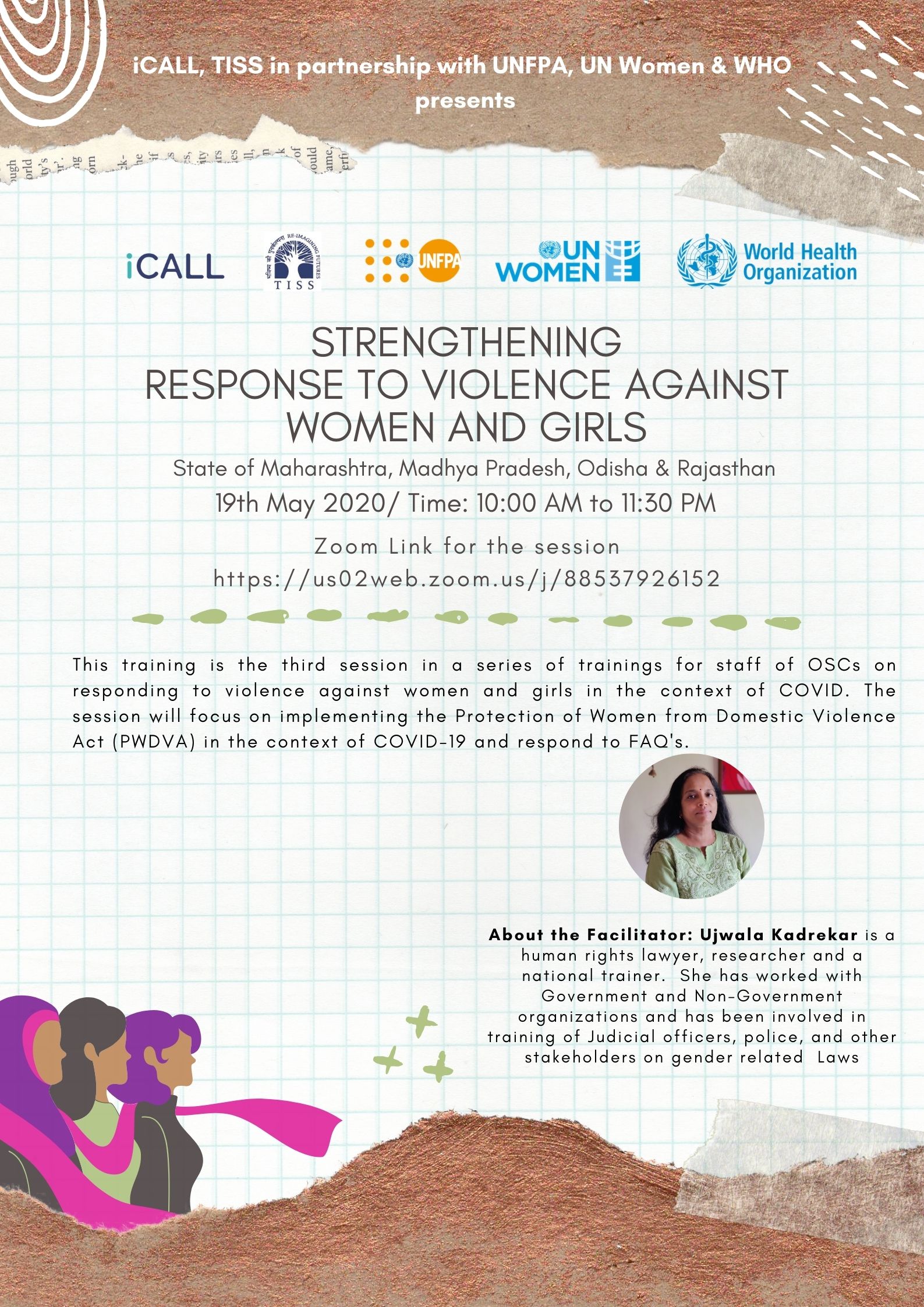

‘Understanding Cyber Violence against Women and Girls in the context of COVID-19: Safety Tips and Response Mechanisms’ on May 20, 2020
Facilitated by National Security Expert and a Crime Investigator, Mr. Amit Dubey
Summary of the session:
The fourth session was conducted on the 20th of May by UNWomen in collaboration with UNFPA and WHO. The training was concered with cyber security and violence against women and girls and was facilitated by Mr. Amit Dubey. Mr. Dubey is a renowned National Security Expert and Crime Investigator. The training provided an overview of cyber violence against women and girls as well as the various forms it takes. The trainer explained the legal redressal mechanisms that can be sought under the Indian Penal Code and the Information Technology Act, as well as helpines and portals dealing specifically with cyber crimes. He also highlighted some tips and advice participants could use to ensure their and their clients’ safety online.
‘Addressing Sexual Harassment at Work: Prevention and Redressal’ on June 5, 2020
Facilitated by Ms. Anju Pandey, Program Specialist - EVAW UN Women and Mr. Soumya Bhaumik, Advocate
Summary of the session:
The fifth session was conducted on the 5th of June by UNWomen in collaboration with UNFPA and WHO. Training facilitators, Ms. Anju Pandey and Mr. Soumya Bhaumik laid down the tenets of the POSH Act and the redressals, aggrieved women can seek under it. They also elaborated on the complaints mechanisms, timelines as well as the actions that could be taken.
‘Violence Against Women and Mental Health’ on June 19, 2020
Facilitated by Dr. Aparna Joshi, Project Director, iCALL and Ms. Tanuja Babre, Programme Coordinator, iCALL
Summary of the session:
The sixth session was on Violence Against Women and Mental Health conducted on the 19th of June by iCALL TISS in collaboration with UNFPA. The training sought to equip the participants with skills of responding to mental health concerns of violated women who may reach out to them for support. An important object of the training was also to establish mental health as an integral and essential component of women’s health and therefore, the reciprocal relationship between mental health and violence.
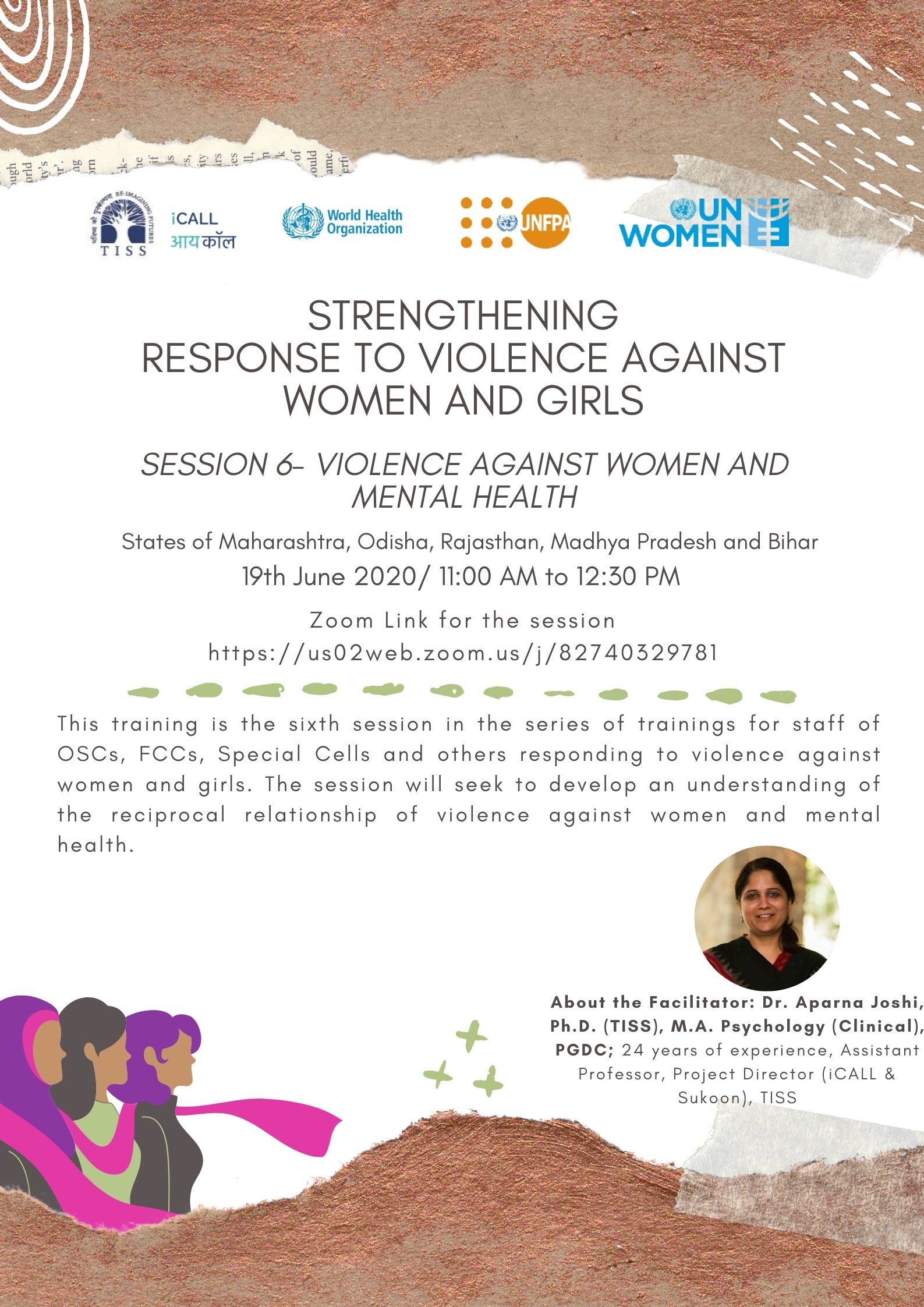

‘Understanding Sexual Violence Against Women and Girls’ on July 10, 2020
Facilitated by Ms. Sunita Dhar, Director, Jagori and Mr. Soumya Bhaumik, Advocate
The seventh session was conducted on the 10th of July by UNWomen in collaboration with UNFPA and WHO. The trainers sought to facilitate an understanding of the issue of sexual violence against women and girls as well as of the comprehensive response based on the One Stop Centers’ standard operating procedure. The session also covered history of laws regarding sexual violence, health care response as well as the importance of DNA evidence in such crimes.
‘Counselling for Sexual Violence Against Women and Girls’ on July 10, 2020
Facilitated by Dr. Aparna Joshi, Project Director, iCALL, Ms. Sindhura Tamanna, Senior Research Officer and Ms. Tanuja Babre, Programme Coordinator, iCALL
The eighth session was conducted on the 19th of June by iCALL TISS in collaboration with UNFPA. It was in continuation of the previous session and sought to equip participants in the skills of counselling for sexual violence against women and girls.
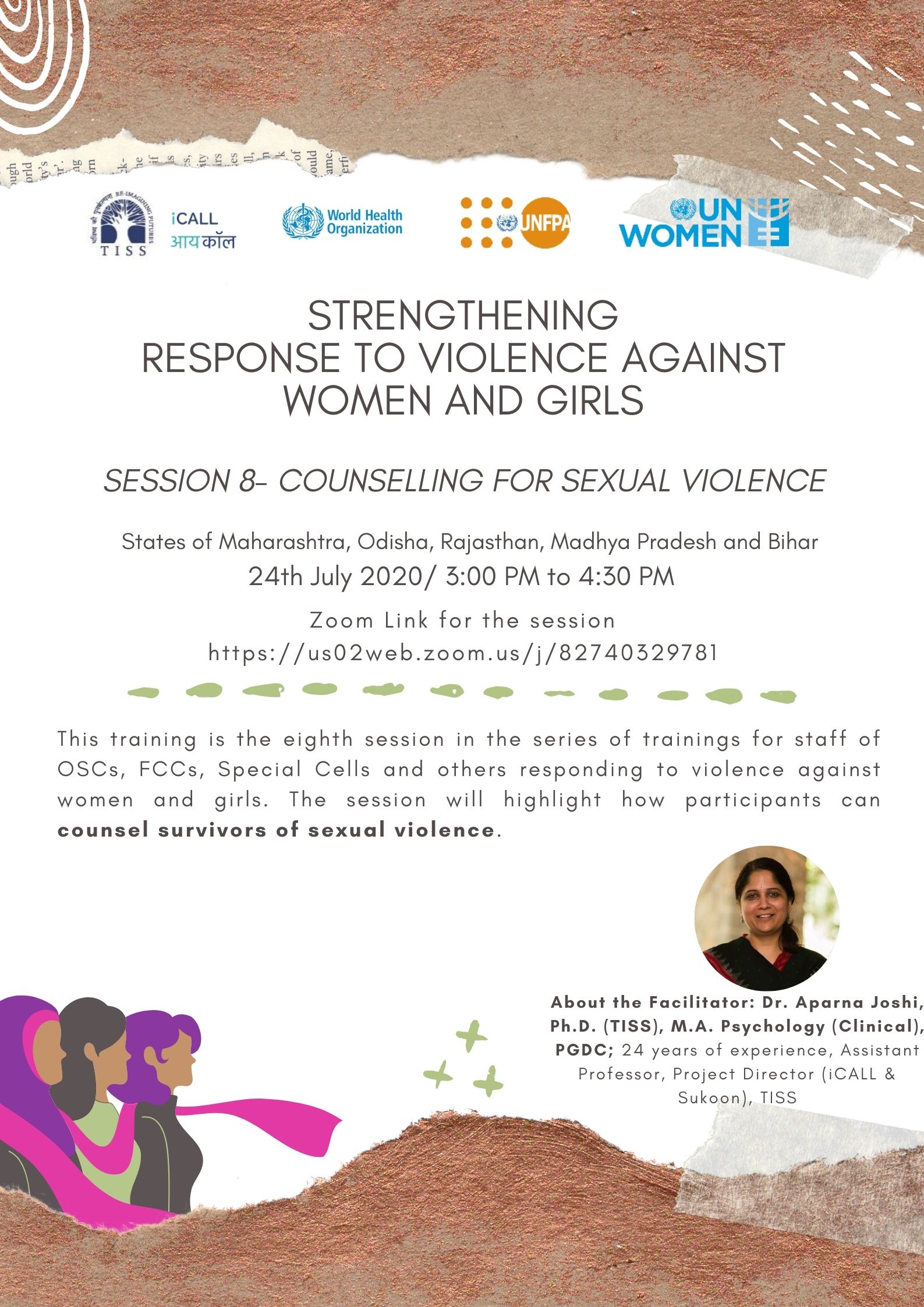

‘PROTECTION OF CHILDREN FROM SEXUAL OFFENCES ACT, 2012 (POCSO)’on August 7, 2020 Facilitated by Advocate, human rights lawyer, researcher and a national trainer Ms. Ujwala Kadrekar and Mr. Santosh Shinde Member, Maharashtra State Commission for the Protection of Child Rights . Keynote speaker, Justice Shalini Phansalkar Joshi, Former Judge of Bombay High Court.
Summary of the session: In the POCSO training, Adv Kadrekar took the participants through the basic tenets of the act, its objective and rationale as well as the general principles for use of professionals and experts assisting the child at pre-trial and trial stages. She also highlighted the important definitions under the Act as well as the graded offences and sentencing. Adv Kadrekar and Mr. Shinde also emphasised on the roles of various stakeholders such as police, child welfare committee, support persons, medical professionals, special court, legal aid lawyers and special public prosecutor.
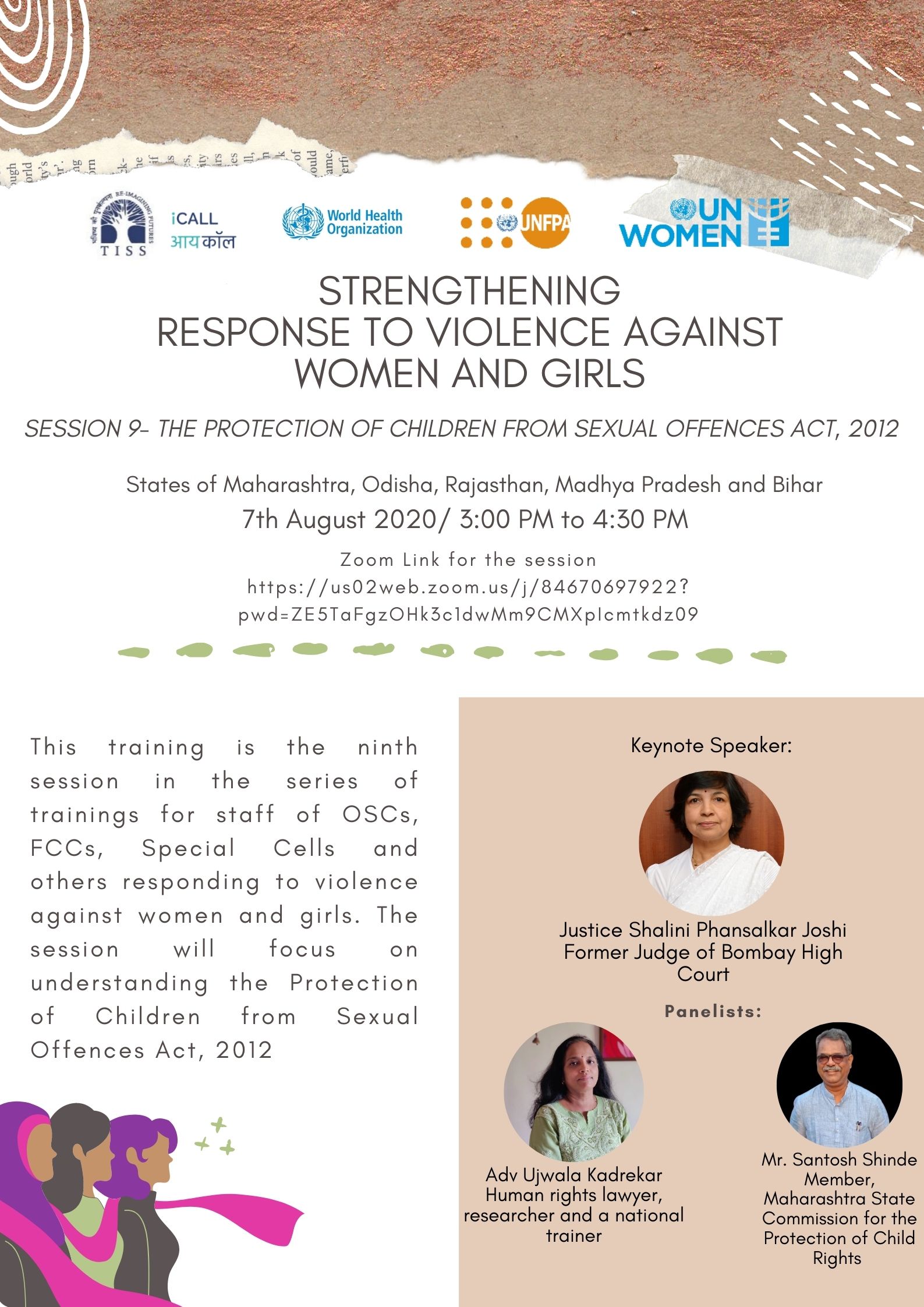

‘Crisis: Psychosocial Response to Suicide & Self Harm’ on August 28, 2020. Facilitated by Dr. Aparna Joshi, Project Director, iCALL, Ms. Sindhura Tammana, Senior Research Officer, iCALL and Ms. Tanuja Babre, Programme Coordinator, iCALL
‘Crisis: Psychosocial Response to Suicide & Self Harm’ is an extension of the various sessions on mental health and psychosocial response previously done by iCALL as a part of this training. The session aimed to equip the participants to deliver a holistic psychosocial response to clients facing crises. The session also sought to highlight the reciprocal relationship violence and mental health have and strategies for subsequent risk assessments and interventions.
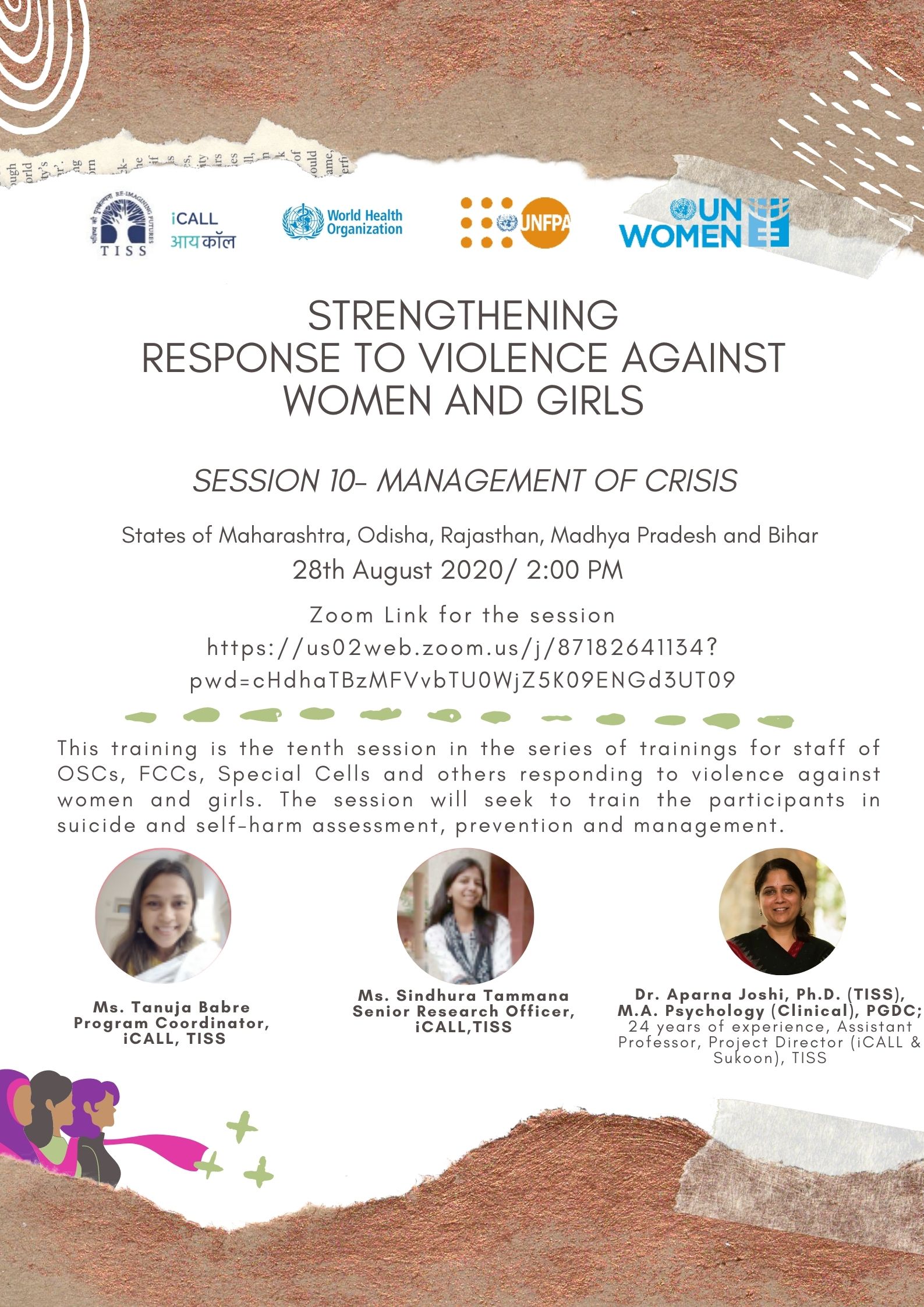

‘Dowry Prohibition Act, 1961’ on September 11, 2020. Facilitated by Advocate, human rights lawyer, researcher and a national trainer Ms. Ujwala Kadrekar.
Summary of the session: The eleventh session in the series of trainings for staff of OSCs, FCCs, Special Cells and others responding to violence against women and girls focused on understanding the Dowry Prohibition Act and how the participants could use it in their interventions for violence against women and girls.
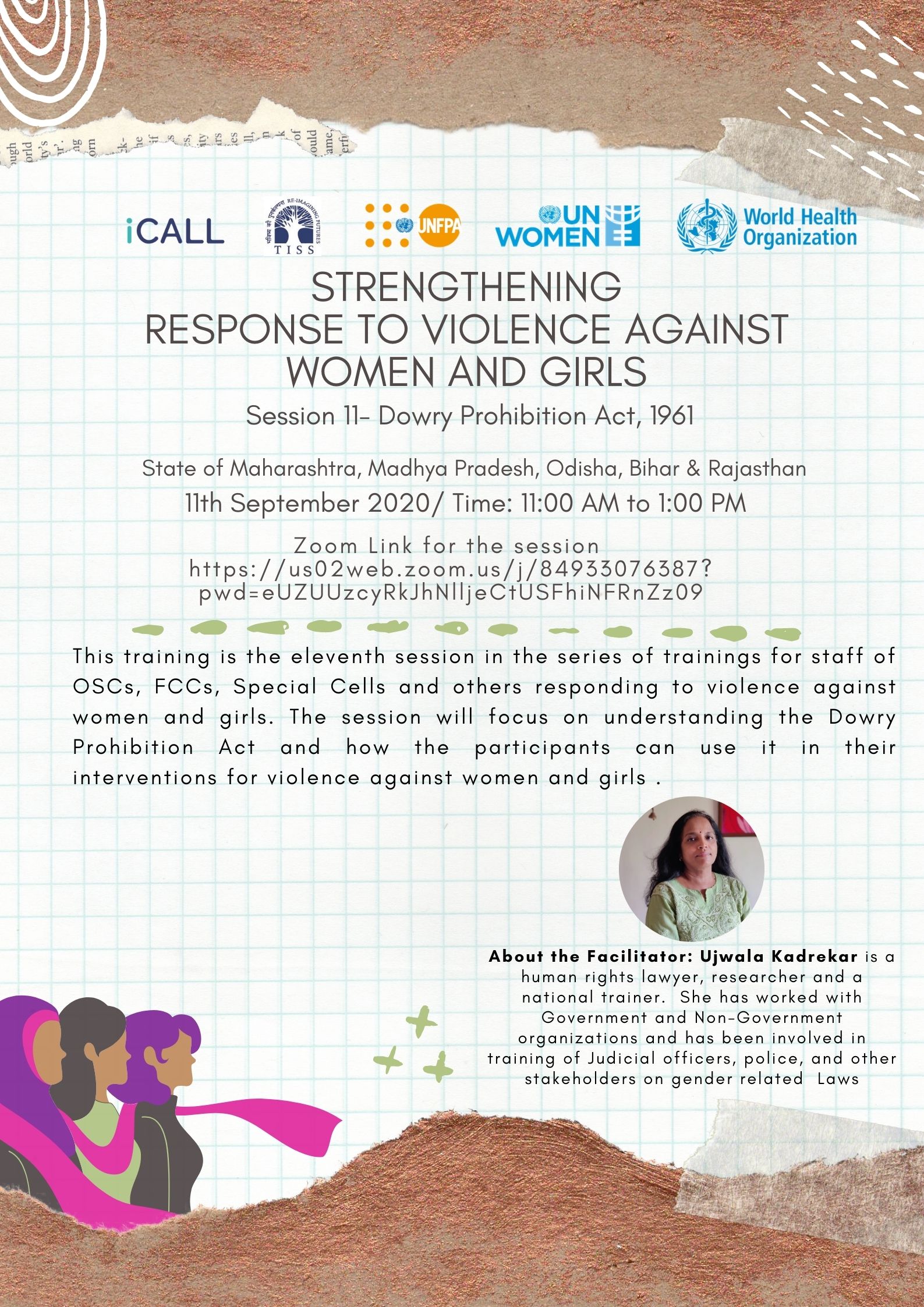

‘Preparedness for COVID-19 Pandemic’ on September 18 2020. Facilitated by Dr. Vatsla Dadhwal, professor, Division of Maternal Fetal Medicine, Department of Obstetrics and Gynecology, All India Institute of Medical Sciences.
Summary of the session: The twelfth session in the series of trainings focused on equipping the participants with the appropriate and important information on the COVID-19 pandemic preparedness and response.
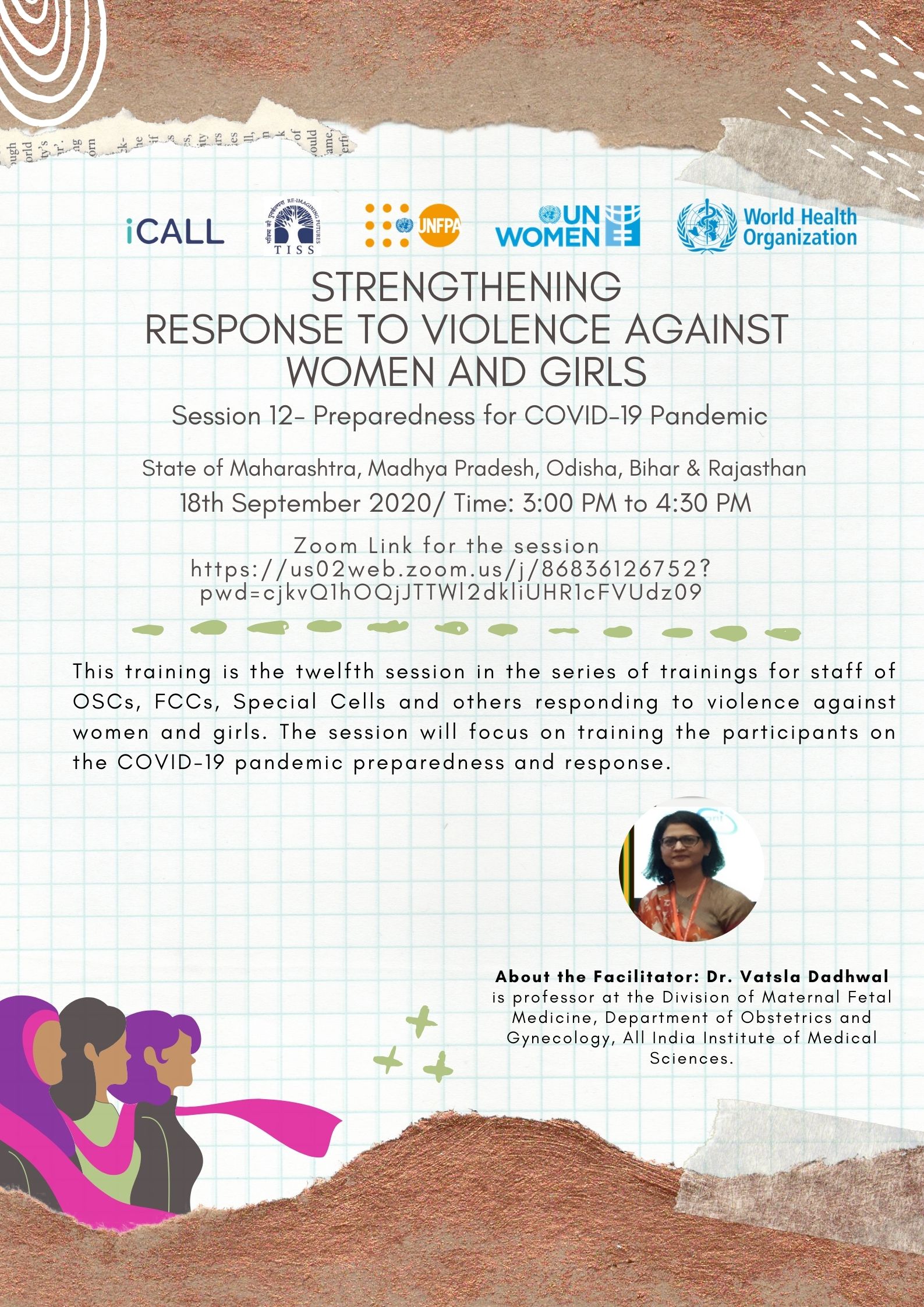

‘Counselling Interventions with Men for Violence against Women’ on September 25, 2020. Facilitated by Dr. Aparna Joshi, Project Director, iCALL and Ms. Tanuja Babre, Programme Coordinator, iCALL.
Summary of the session: The thirteenth session in the series of trainings sought to build skills of the participants with respect to counselling interventions with men who perpetrate violence against women. The facilitators highlighted the importance of working with men individually and in joint sessions and including men in strategies for preventing and intervening for domestic violence. Through discussing the various strategies for intervention with men, the session aimed to establish the importance protecting the survivor, all the while holding men accountable for the violence and for the change process towards non-violence.
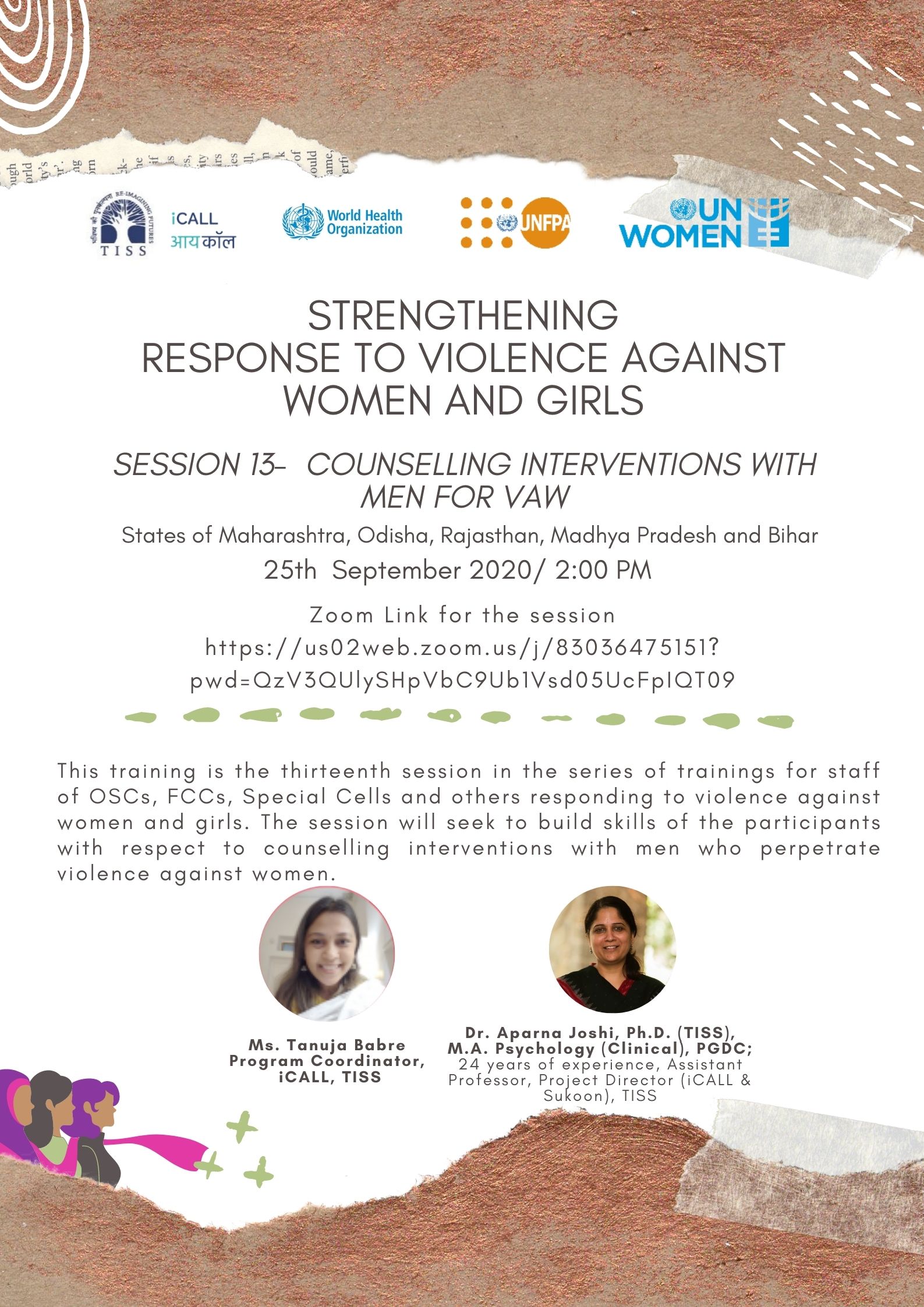

‘Early and Child Marriage’ on October 9, 2020. Facilitated by legal researcher, Swagata Raha and Advocate, human rights lawyer, researcher and a national trainer Ms. Ujwala Kadrekar.
Summary of the session: The fourteenth session in the series of trainings for staff of OSCs, FCCs and Special Cells focused on understanding and demystifying the Prohibition of Child marriage Act as well as conflation between PCMA and POCSO and issues around criminalising adolescent sexuality.
